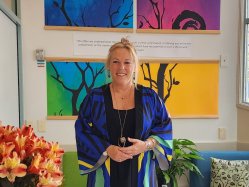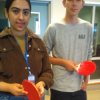Lindy Lely Kawharu's passion for volunteering is positively infectious!

It’s difficult to know how to encapsulate Lindy Lely Kawharu in just one phrase – but perhaps ‘magnificent force of nature’ might be a good place to start.
For nearly 10 years, Lindy has been the Volunteer Manager at Te Toka Tumai (formerly the Auckland District Health Board), where she oversees a plethora of volunteer programmes across three hospitals – Starship Children’s Hospital, Auckland City Hospital, and the Greenlane Clinical Centre.
She radiates a positive energy and passion that is positively infectious (pun intended!) – and is the driving force which inspires teams of committed volunteers. Her boss, her small team of three volunteer co-ordinators, and the more than 139 volunteers she manages, sing her praises.
‘Lindy is passionate about volunteering,’ says her boss Neil Browne, Operations Manager Non-Clinical Support. ‘You can tell from the way she talks about it, and the glint she gets in her eye. She’s incredibly knowledgeable, and is great at motivating people and managing them. And she’s really innovative about rolling out new programmes and finding ways to support patients and their families.’
Volunteering Auckland honoured Lindy’s dedication and success by awarding her our supreme accolade in November last year – the Leader of Volunteer Engagement Award. The award recognises people who have shown exceptional volunteer leadership, dedication, and passion, and who have a substantial record of commitment.
It would be hard to go any further without summarising the volunteer programmes Lindy oversees – and getting some sense of the sheer scale of what’s involved.
• Therapy Dogs – initially in Starship, and now also in the general wards
• Companion Volunteers – who support patients experiencing loneliness, isolation, or difficulties engaging with rehabilitation programmes
• Family Support volunteers – who help families of patients – particularly those from out of town – with support, advice, and companionship when visiting the hospital
• Starship School volunteers – who help qualified teachers provide guidance to children, either in Starship’s on-site school, or in their hospital rooms.
• Starship Information Desk volunteers – who greet patients, parents and relatives on arrival, and help with directions to clinics, wards, and other facilities
• Starship Grandparents – who provide care and support for children whose families cannot be with them – such as long-term patients and children from out of town
• Starship Toy Library volunteers – who deliver toys and games to children on the wards
• Blue Coats – who do a fantastic job welcoming and supporting visitors to the Auckland City Hospital and Greenlane Clinical Centre
• Tea trolley service at the Greenlane Clinical Centre – where the Eye Clinic alone has nine waiting rooms, and a hot cuppa is always welcome
Each of the programmes represents an impressive undertaking – but the scale of them all combined is nothing short of astonishing.
But wait – there’s more!
Not content with these already significant successes, Lindy has ideas bubbling away for more programmes they could deliver. She says healthcare staff often tell her there are still many other opportunities where volunteers could support staff, where it’s appropriate and useful. For instance, they might help patients having speech-language therapy to practice between their appointments with the therapist. There’s an unmistakable gleam in her eye as she contemplates how to make this kind of support happen.
‘We need to cherish and harness the feeling of looking after the sick, the elderly, and the disabled. That’s a mark of humanity,’ says Lindy.
The impact of the volunteer programmes on the patients – both children and adults – is immense.
Over the years, Lindy has accumulated a wealth of examples of the impact the volunteer programmes have had. When I ask about them, one in particular springs immediately to Lindy’s mind.
‘We had one man from India, who’d had a stroke. He had trouble with English, but was still very good in his particular Indian dialect. It so happened that we had a Companion Programme volunteer who spoke that language. The joy it brough that man to be able to talk to someone in his mother tongue was just amazing!’
Lindy’s megawatt smile shines at the memory.
‘The Companion Programme is quite wide. It could be sitting with them and having a yarn, helping with meals, or bringing them a magazine or newspaper. Sometimes they might help a patient with the self-exercise they need to do – on the sidelines, perhaps counting, or offering encouragement and validation. You know “well done – that went better than yesterday”. That sort of thing.’
Rod Whitmore is one of the three Volunteer Co-ordinators who round out Lindy’s team – and says Lindy is a true inspiration. ‘She’s extremely helpful and supportive – and the values she’s built into the programmes really align with my values.’
Before that, Rod spent four years volunteering at Starship, primarily on the information desk – after an illness in the family prompted him to ‘re-assess where I was in my life’.
‘I found the Starship opportunity and absolutely loved it!’ he says. ‘I love the feeling that volunteering gives you. You see what it does for the patients and their families – at a time when they’re in a really stressful situation.’
Four years later, he’s taken up the opportunity to help Lindy manage the volunteer programmes. Not only is he loving his new role, too – he’s also inspired his wife Keshina to become a Companion Volunteer. As Rod and I are chatting, Keshina arrives for her regular three-hour Saturday shift – something that clearly gives her as much pleasure as she brings to the patients she visits.
Hard on her heels, Pet Therapy volunteer Mark Hannan arrives with his springer spaniel Sandy. They only have time for a few quick photos before they head off to visit their first patient in the hospital’s general wards – but even a brief acquaintance with laid-back spaniel Sandy (oh, those eyes!) is evidence of why the programme brings such joy.
Lindy counts the expansion of the Pet Therapy programme as one of her proudest achievements.
When she joined the hospital in 2014, the Pet Therapy programme had already been running at Starship for four years, and was held in the atrium area.
‘It was a two-year uphill battle for me to get the pets on the wards at Starship,’ she says. ‘The children at Starship had clown doctors at the time – plus a playroom, school, Radio Lollipop, and more. But the sickest children, who couldn’t leave their beds, had very little.
‘For a sick child to feel the little nose of a poodle sniffing them is wonderful. For them it’s really comforting to have a pet therapy dog coming to say hello.’
Lindy outlines the rigorous health and safety protocols involved in the Pet Therapy programme. The dogs are fully trained, including extensive character and behavioural checks. The dogs are fully immunised, and are washed and groomed before visits. No dog is allowed on a hospital bed without the added protection of special sheets, and they don’t lick the child.
‘We see how much the children love it when they see the dogs. They eventually forget about their pain. Those dogs are their friend.’
That success paved the way for the Pet Therapy programme to be extended further into the general wards at the neighbouring Auckland City Hospital, where it’s also proving a huge success.
There are hundreds more stories of the many ways that the many volunteers have brightened the lives of those they’ve helped – through Family Support, the Starship School, the Blue Coats at the Starship and General Information Desks, Starship Grandparents, Starship Toy Library, and the Greenlane Tea Trolley Service. There would easily be enough to fill a book – and it’s impossible to tell them all here.
‘What our volunteers do makes a big difference to the whānau as well – knowing that their mum, dad, or child, is getting that help and attention. The medical staff are amazing – but they have so many patients, and are incredibly busy. Our volunteers can focus on specific patients and provide that extra support,’ she says.
‘Some patients don’t want their family to see how much they’re struggling. They put on a brave face, because they don’t want to be a burden. Our volunteers may be strangers – but they’re just like the person next door.’
There’s also a profound impact on the volunteers themselves.
‘Volunteering is a two-way process,’ says Lindy. ‘The challenge in modern volunteering is that if it isn’t meaningful, they won’t come. But if you offer something meaningful, they will come – and they will stay. They feel useful. They learn a lot. They know the difference they are making.’
Volunteer roles must be the right fit, Lindy points out: the right times, the right positions for each volunteer to undertake.
‘It’s a privilege to lead a team of people who want to help and support the patients, their whānau, and the staff,’ says Lindy. ‘They bring such joy – and that gives me great joy as well.’
The volunteers across Lindy’s programmes come seven days a week. Some roles are time-flexible, but others are on a fixed roster.
‘We currently have 139 volunteers. That’s half the number we had before Covid. When I came back in May last year [after extended leave including travels through Europe] we were down to 80 – but it’s climbing steadily.’
The growth is testament to Lindy and her team’s positivity and tenacity. Hospitals naturally faced particularly stringent precautions and protocols during Covid, to keep patients safe – and volunteer programmes were heavily disrupted.
While Lindy is at pains to point out that ‘you never do this work alone’, her personal influence on the success of the programme’s is plain to see.
Under Lindy’s confident and dedicated leadership, it seems clear that the volunteer programmes at the three hospitals will continue to thrive and grow – and bring comfort and joy to countless patients and their whānau.
By Ruth Jackson
Volunteering Auckland Media & Marketing

